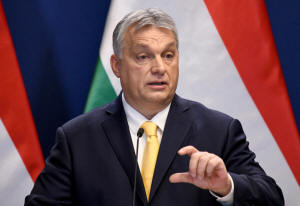Analysis: As polls tighten, Hungary's Orban steps up pre-election
spending
 Send a link to a friend
Send a link to a friend
 [February 04, 2021]
By Gergely Szakacs [February 04, 2021]
By Gergely Szakacs
BUDAPEST (Reuters) - Ahead of an election
next year, Hungarian Prime Minister Viktor Orban is spending money on
key groups of voters as opinion polls show a neck-and-neck race with an
opposition united against him for the first time.
The right-wing premier, in power since 2010, is under pressure to reopen
the economy after a pandemic-driven crash that sent Hungary into its
worst recession since the global financial crisis, ending seven years of
steady growth.
A tally by news website hvg.hu showed about a quarter of the spending
channelled via a $12 billion COVID recovery fund last year was linked to
the pandemic as Orban spent on other items, including support for ethnic
Hungarians living elsewhere in central Europe, who backed him in
previous elections.
Orban is also handing out extra payments for pensioners from February,
plans to scrap income tax for younger people from 2022 and is offering
grants to families to renovate their homes - measures worth about 1% of
gross domestic product (GDP) combined, or about $2 billion.

His government is also extending a generous family benefit regime that
now costs nearly 5% of GDP per year and represents Orban's most popular
policy among undecided voters, according to a 2020 survey by think tank
Policy Solutions.
Orban's minister in charge of family policy, Katalin Novak, told Reuters
that the latest measures were an extension of the governing Fidesz
party's decade-old policies rather than electioneering ahead of a
national vote due in just over a year.
"We are in a fortunate situation as Hungarian people are family-centric,
therefore, they assess measures to help families or young people
starting a family positively," said Novak, one of Orban's deputies at
the helm of Fidesz.
"We are ready to continue on this path and pledge that we will not cut
back on family benefits. On the contrary, we will continuously expand
them."
Orban, 57, has been criticised abroad for anti-immigration rhetoric and
reforms that the European Union says amount to authoritarianism, which
he denies. But he has been popular at home, winning three straight terms
to become Hungary's longest-serving post-communist leader.
Peter Virovacz, an economist at ING in Budapest, said the government's
scope to take measures that help its election prospects has been vastly
increased by the pandemic, which has eroded budget discipline across
Europe.

"The execution of an election-style budget is helped by the fact that
the 2020 shortfall could be blamed on COVID, which meant there was
nothing the budget could not take, and this had opened up the
floodgates," Virovacz said.
[to top of second column]
|

Hungarian Prime Minister Viktor Orban holds an international news
conference in Budapest, Hungary, January 9, 2020. REUTERS/Tamas
Kaszas

In less than a year, Hungary has gone from targeting a balanced
budget in the foreseeable future to a deficit worth around 9% of
GDP.
COPY-PASTE FROM WARSAW
With the proposed income tax cut for people under 25, Orban is
taking a page out of the playbook of his conservative Polish ally,
Jaroslaw Kaczynski, whose PiS party launched a similar measure ahead
of the 2019 national election.
PiS won fewer votes among people aged 18-29 than in other age
groups, according to an Ipsos exit poll. A recent Hungarian survey
showed a similar pattern among younger voters.
"This is a copy-paste proposal," said Andras Biro-Nagy at Policy
Solutions. "It is logical that they are trying to do something as
this is Fidesz's weakest demographic. They are trying to avoid
losing this age group at the next election."
A December survey by Hungarian think tank Zavecz Research showed
support for Fidesz at 33.1% in the 18-29 demographic, the lowest
among all age groups and just below support for the joint opposition
party list.
At the same time, the level of undecided voters was by far the
highest in the same age group. The united opposition held a
four-point lead over Fidesz among all voters, reflecting a
tightening race seen in other polls.

Orban is also reviving a 13th month pension in a symbolic move as
the payment was scrapped under a leftist government as part of an
International Monetary Fund-led austerity programme that rescued
Hungary from the brink of financial collapse.
The prime minister argues that any return of his leftist opponents
to power would lead to similar recklessness in public finances, an
area where Fidesz had a strong record prior to the pandemic.
Despite catching up with Fidesz at the polls, the opposition still
faces hurdles, including agreeing on a joint candidate list and
presenting a viable challenger to the combative Orban.
"Fidesz has been weakened by the pandemic, the government faces a
highly unpredictable economic and public health environment in 2021
and polls show that a united opposition could become a serious
headache for the ruling party," said Andrius Tursa, a political
analyst at Teneo Intelligence.
(Reporting by Gergely Szakacs; Additional reporting by Alan Charlish
in Warsaw; Editing by Giles Elgood)
[© 2021 Thomson Reuters. All rights
reserved.] Copyright 2021 Reuters. All rights reserved. This material may not be published,
broadcast, rewritten or redistributed.
Thompson Reuters is solely responsible for this content. |